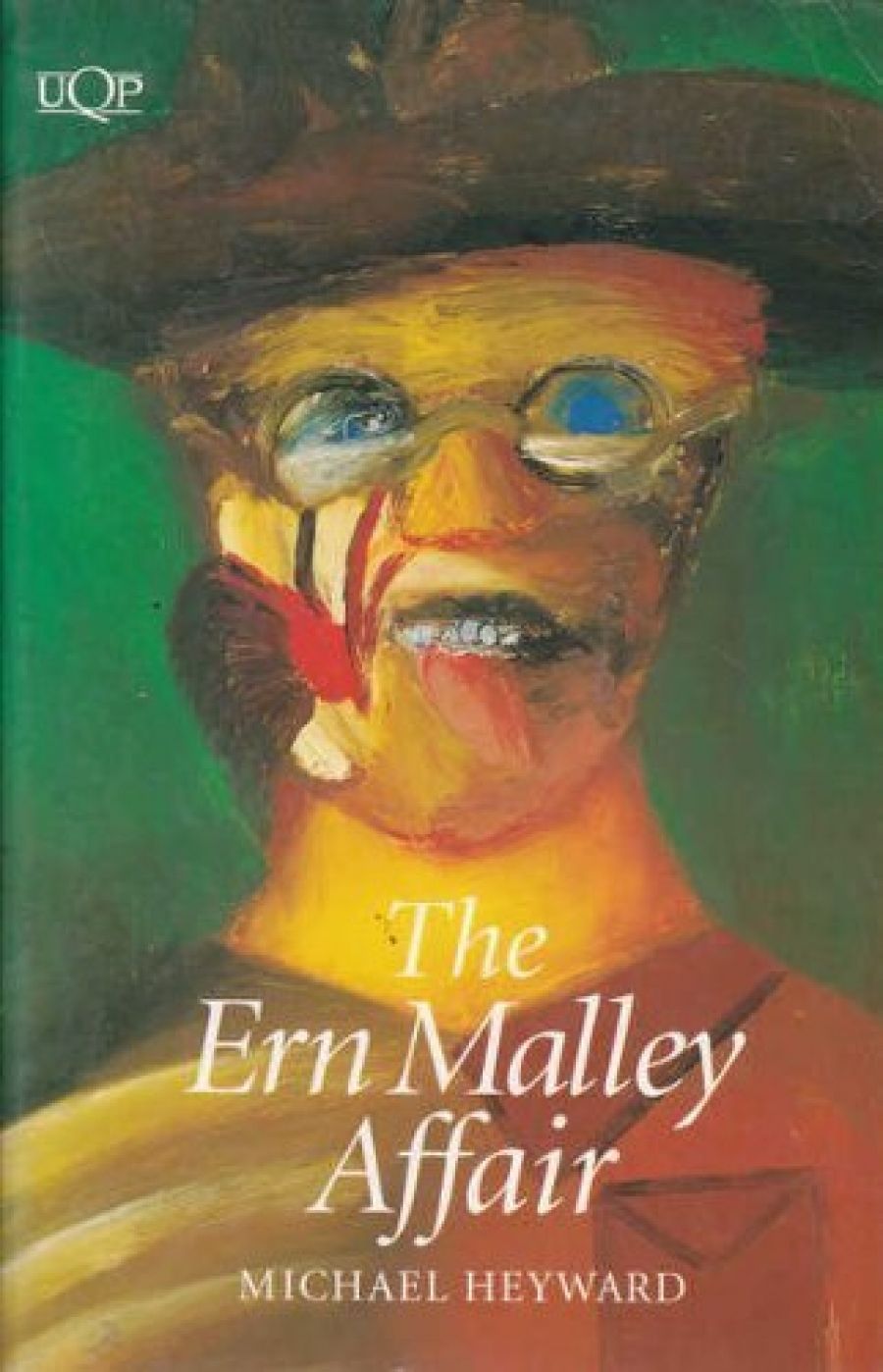
- Free Article: No
- Contents Category: Poetry
- Review Article: Yes
- Online Only: No
- Custom Highlight Text:
Well I’m damned! Ern Malley of all people! It’s been fifty years since I last laid eyes on him. Seeing him again recalls my vanished youth as nothing else could. Angry Penguins, Cecily Crozier’s valiant Comment magazine, the ‘social realists’ upbraiding everyone like so many Marxist Savonarolas, the Jindyworobakians quarrelling with the ‘cosmopolitans’, the Contemporary Arts Society quarrelling with itself – stirring times! But Ern was the epicentre of our cultural storm in a teacup.
- Book 1 Title: The Ern Malley Affair
- Book 1 Biblio: University of Queensland Press, $32.95 hb
- Book 1 Readings Link: https://www.booktopia.com.au/the-ern-malley-affair-michael-heyward/book/9781740512701.html
Probably it’s only Old Kaspars of my generation who will be aware of the astonishing hullabaloo provoked by Ern. For the benefit, then, of any Little Peterkins who may want to know, I’ll do my best – mumbling through toothless gums – to recall the genesis of the business.
What happened was that a couple of mad wags called McAuley and Stewart, poets both of them and pretty good in their own way, decided to take the mickey out of the ‘modern school’ of poetry, represented pre-eminently at that time by Max Harris and his Angry Penguins magazine.
For this purpose, they dreamed up a fictitious ‘Ern Malley’ who was supposed to have died some years previously, composed what they later insisted were deliberately absurd verses in his name, and had his equally nonexistent sister Ethel submit them to Angry Penguins. Max accepted them, accepted them what’s more with the generous enthusiasm that was always one of his most endearing characteristics. Ern’s poems, he proclaimed, were undoubted works of genius. His coeditor, John Reed (whose opinions on poetry were about as deserving of attention as mine on the Arian Heresy) concurred. Sid Nolan was inspired, if that’s the word I want, to paint a tree looking like a cabbage. In short, a terrible beauty was born and the two responsible scamps must have been staggered to find their little prank succeeding so completely. They gleefully revealed that Ern and his poems were just part of an elaborate tease and there was great guffawing and slapping of thighs in Australia’s clubs, locker-rooms and stock exchanges.
It’s a shameful confession but I have to admit that I guffawed, too. Today, having read and re-read Ern’s stuff, I think that Max may have over-estimated the merit of the poems but that he was quite right insisting that they were poems, genuine poems. McAuley and Stewart had tripped over their own metrical feet. Whatever they might have intended, they had in fact produced works to which I and others now respond with belated delight.
That Ern was authentically a poet, incidentally, strikes me as the only explanation for his longevity. McAuley and Stewart planned and carried out their hoax with considerable ingenuity. But, after all, there have been God knows how many literary hoaxes at different times and almost all of them are now forgotten by everyone except a few drudging literary historians. About the only ones generally remembered are Macpherson’s ‘Ossian’ and Chatterton’s ‘Thomas Rowley’ and they are remembered, I’d argue, for the same reason that Ern is still among us – they were bogus poets but they were, nonetheless, incontestably poets.
I’m not as confident as Mr Heyward seems to be that Ern’s begetters were in fact motivated solely by disinterested anxiety to reassert traditional values. Max was pretty brash in those days – we all were, but Max was more conspicuous than the rest of us. Me, I liked and admired him. I still do. A lot of people didn’t. I’d guess, although I’ve no evidence, that McAuley and Stewart were among them. Mr Heyward quotes a statement which they gave to the press and I think I detect a note of personal spite. He also quotes a letter from A. D. Hope (who was in on the joke from the beginning) and it is unabashedly malevolent in its references to Max.
Until I read Mr Heyward’s book, I wasn’t aware that Max and John Reed had briefly entertained the notion that my friend Adrian Lawlor and I might have concocted Ern’s work. Mr Heyward cites certain resemblances between Ern’s poems and my own to account for this conjecture. But if there was no more to it than that, why should Adrian have been considered as a possible fellow conspirator? I think I know. There had been a proto-Ern called Mort Brandish, a fake poet invented by Adrian and myself. Unlike McAuley and Stewart, we were not out to prove a point or put the skids under anyone. Mort was simply an invention designed for our own amusement. I must have told Max about this innocent bit of whimsy and, hence, his momentary suspicion that we were perhaps repeating the performance in the guise of Ern Malley.
As far as I can tell, Mr Heyward hasn’t overlooked anything else. The industry with which he has retraced Ern’s career is impressive, stupefying even. He lists no fewer than sixty notables who assisted him in his research. Were his and their efforts worth the trouble? On the whole, I’m inclined to think not. Ern’s poems will, I fancy, continue to be read (unlike poor old Mort’s) so to that extent Mr Heyward’s investigation is justified. He is right, too, to remind us, as an example of censorship at its barmiest, that the cops managed to uncover some ‘obscenities’ in them so that Max, as the publisher, was hauled before the courts. But the hoax itself, that surely is beginning to look its age, to creak at the joints. Aren’t we all?


Comments powered by CComment